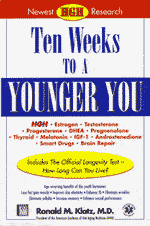10255
0
Posted on Nov 10, 2003, 11 a.m.
By Bill Freeman
The American Board of Anti-Aging Medicine now credentials anti-aging specialists. They are the vanguard of this next generation of health care
Choosing an Anti-Aging Physician

The American Board of Anti-Aging Medicine now credentials anti-aging specialists. They are the vanguard of this next generation of health care, medical doctors who have dedicated themselves to the art and science of achieving optimal health and preventing or delaying age- associated disease. To locate a qualified anti-aging physician in your area, please see the on-line Anti-Aging Physician Directory or call A4M at 800.558.1267 to order your copy of the A4M's Physician Directory and Resource Guide.
If you can not find an anti-aging specialist in your area, look for someone who has an orientation in preventive medicine, nutritional medicine, or Olympic sports medicine. These doctors are the most aware and best- educated in the latest techniques and resources for longevity and maintaining the highest quality of optimum health.
To qualify your anti-aging consultant, ask the doctor the following questions:
-
Do you think we can delay aging or the diseases associated with aging? A physician who practices anti-aging medicine believes that we can postpone or reverse many of the biochemical changes associated with later life disease, such as heart disease, cancer, stroke, and diabetes.
-
What do you do for your own health? Physicians who have an anti-aging orientation practice what they preach: exercising regularly, taking high quality multivitamin and mineral formulas along with supplements of antioxidants and other compounds that reflect their own research and that of others.
-
How many patients are you actively treating with anti-aging regimens? A physician who practices anti-aging medicine should have a minimum of 30 to 40 patients who are committed to a program of optimal health.
-
How do you keep up with latest advances? Your doctor should subscribe to periodicals that report on the latest anti-aging findings, such as the International Journal of Anti-Aging Medicine, the Archives of Gerontology and Geriatrics, or other similar peer-reviewed publications. Your doctor should also have access to a number of databases on medical advances throughout the world and regularly attend scientific educational conferences, like the medical conferences hosted by the American Academy of Anti-Aging Medicine, the Gerontological Society of America, or the American Aging Association, etc., where they receive reports from top scientists about cutting edge research and network with their colleagues.
-
Do you see your patient as an active partner or a passive recipient? As you become more involved in your personal life extension program, you will find that you will want to read everything on the subject, subscribe to magazines yourself, and perhaps start attending anti-aging medical conferences as well. As you become more knowledgeable, your relationship with your doctor becomes more like that of a colleague.
-
Do you believe in regular follow-up? It is essential that you see your doctor every three to four months to make sure that there are no adverse side effects, to adjust the dosage if needed, and to determine if the therapies are working.
Quality sleep time is essential for health and longevity. Recently published reports indicate that on any evening, 1/3 of Americans suffer from sleep disturbance and as much as 45% of all Americans are sleep deprived.
-
Limiting our natural sleep cycles by unnatural stressors such as electric lighting, poor ventilation, excess emotional and psychological stress can take its toll on your maximum life span. American Demographic Magazine reports that 43% of surveyed adults who sleep less than six hours per night feel stressed compared to only 14% of adults who sleep seven to eight hours per night.
-
Quality sleep time is critically important for the release of important hormonal repair stimulators such as HGH and melatonin.
-
Young people typically sleep ten hours per night, compared to older folks, who have difficulty sleeping six hours. Sleep is important for control of stress and allowing for repair of the body.
-
Set a normal time for going to sleep and waking up. One of the worst things for your internal bioclock is an irregular sleep schedule.
-
Sleep in a quiet, cool room with a good quality comfortable bed. Use room darkening shades if necessary to keep your sleep chamber free from light. Melatonin production is turned off by light, even short moments of light, which can lead to sleep disturbances -- so turn off the nightlight.
-
Try to remember your dreams. If you cannot, it may signal an inability to achieve quality deep sleep.
-
Avoid alcohol or drugs before bedtime.
-
Avoid drinking lots of water before sleep, your bladder may wake you up too early.
-
If you suffer from sleep difficulties and are over age 40, consider occasional supplementation with low dose melatonin. Melatonin is a natural hormone that stimulates the sleep cycle within the brain). Supplement with melatonin no more than two to three times per week and see your doctor if you experience no improvement.
Note that poor sleep may also be a result of a disruption of the air passage that leads to snoring -- which can be an indicator of an even more problematic condition known as sleep apnea. In apnea, breathing actually stops for prolonged periods of time, as long as one to two minutes. This leads to diminished blood oxygen content and an inability to achieve deep sleep. If you suspect that apnea may be a factor in your poor sleep, consult your physician immediately.









